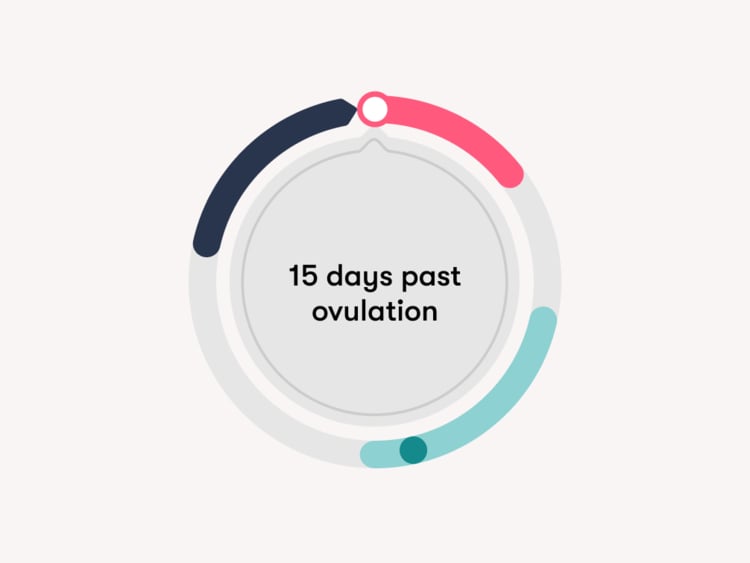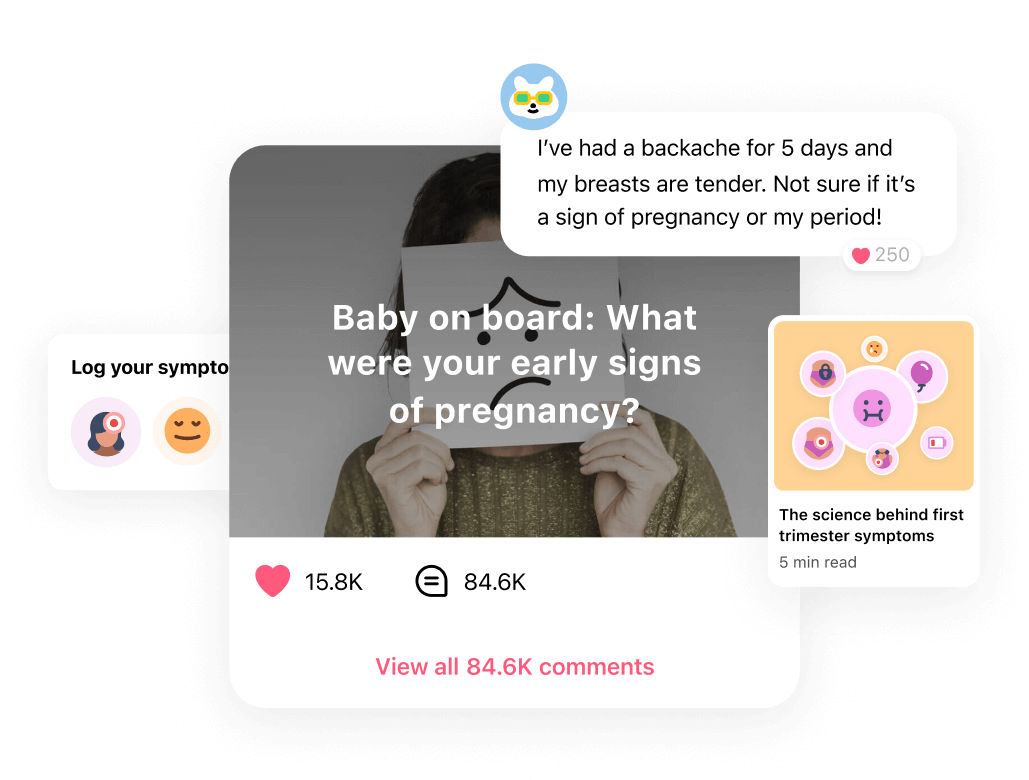It’s normal to look for signs that you’re pregnant, but is it too early to tell? Here’s the lowdown on 15 DPO, including whether you can take a test.
-
Tracking cycle
-
Getting pregnant
-
Pregnancy
-
Help Center
-
Flo for Partners
-
Anonymous Mode
-
Flo app reviews
-
Flo Premium New
-
Secret Chats New
-
Symptom Checker New
-
Your cycle
-
Health 360°
-
Getting pregnant
-
Pregnancy
-
Being a mom
-
LGBTQ+
-
Quizzes
-
Ovulation calculator
-
hCG calculator
-
Pregnancy test calculator
-
Menstrual cycle calculator
-
Period calculator
-
Implantation calculator
-
Pregnancy weeks to months calculator
-
Pregnancy due date calculator
-
IVF and FET due date calculator
-
Due date calculator by ultrasound
-
Medical Affairs
-
Science & Research
-
Pass It On Project New
-
Privacy Portal
-
Press Center
-
Flo Accuracy
-
Careers
-
Contact Us
15 DPO: Can you take a pregnancy test at 15 days past ovulation?


Every piece of content at Flo Health adheres to the highest editorial standards for language, style, and medical accuracy. To learn what we do to deliver the best health and lifestyle insights to you, check out our content review principles.
If you’re trying to conceive, you might be curious if you can take a pregnancy test at 15 days past ovulation (DPO). The roller coaster that is the two-week wait may finally be over, and you might get an accurate pregnancy test result around this time, so it’s normal to have mixed feelings.
The best time to take a pregnancy test can vary slightly depending on how long your cycle is. 14 DPO is the earliest time you might want to consider doing a test. If your cycle is longer, then you may still have a few more days to wait.
Either way, you might have started to feel slightly different and wonder if it’s related to early pregnancy signs. Here’s what you might be feeling at 15 DPO, including what might be happening with your body right now and when you can take a test.
Key takeaways
- Many doctors recommend that you wait until at least the first day of your missed period before you take a pregnancy test. This can be slightly different for everyone, as your cycle length is unique to you.
- At-home pregnancy tests detect the pregnancy hormone human chorionic gonadotropin (hCG) in your urine. While your hCG levels start low, they rise rapidly in the first weeks of pregnancy.
- Implantation (when a fertilized egg attaches to the lining of your uterus) marks the official start of pregnancy. This usually happens between 6 and 10 DPO. From this point, your hCG levels start to rise. By 15 DPO, they may be high enough for a test to pick up.
- It can be tempting to reach for a test before you’ve missed your period, but if you test too early, you run the risk of getting a false negative.

 Over
7.8M
ratings averaging
4.8/5
*
Over
7.8M
ratings averaging
4.8/5
*
Understand your body’s signals with the Flo app
- Chat with others who are trying to get pregnant.
- Get trusted information on signs of pregnancy from 100+ medical experts.
- Log your symptoms and learn what they could be trying to tell you.
 Over
7.8M
ratings averaging
4.8/5
*
Over
7.8M
ratings averaging
4.8/5
*

Trying to conceive?
The Flo app can help you through the two-week wait.

 Over
7.8M
ratings averaging
4.8/5
*
Over
7.8M
ratings averaging
4.8/5
*
Understand your body’s signals with the Flo app
- Chat with others who are trying to get pregnant.
- Get trusted information on signs of pregnancy from 100+ medical experts.
- Log your symptoms and learn what they could be trying to tell you.
15 DPO: What to expect
15 DPO — or days past ovulation — means that around two weeks ago, one of your ovaries released an egg to be potentially fertilized by a sperm. This is a pretty important time in your cycle if you’re trying to conceive. To understand why, it can be helpful to think of your cycle as two parts or phases.
- The follicular phase: The first part of your cycle is called your follicular phase. It starts on the first day of a new period. If your cycle is around 28 days, then your follicular phase covers the first 14. Cycles can be between 21 and 35 days long and still considered typical. During your follicular phase, your estrogen levels rise, and the lining of your uterus thickens in preparation for a potential pregnancy. Your ovaries also ready an egg to be released during ovulation.
- The luteal phase: Around day 14 (if you have a 28-day cycle), one of your ovaries releases an egg. This is called ovulation and marks the start of your luteal phase. Depending on the length of your cycle, you may be close to the end of your luteal phase at 15 DPO. During this time, your progesterone levels rise, and your body may be preparing for your next period.
If implantation did happen this cycle, then you may be pregnant at 15 DPO. Congratulations! After a fertilized egg attaches to the lining of your uterus, your placenta starts to grow. Amazingly, alongside supporting your fetus, your body produces a whole new organ that provides your fetus with nutrients.
The placenta also starts to release hCG (the hormone that pregnancy tests detect). If implantation happened around 6 to 10 DPO, then you might be curious if you can take a test at 15 DPO and get an accurate result.
Can I take a pregnancy test at 15 DPO, or is it too early?
As implantation can take between six and 10 days, you may be officially pregnant from around 6 to 10 DPO. This means that at 15 DPO, you might have been pregnant for a week, and you may be eager to take a test.
Doctors recommend that you wait until the first day of your missed period before taking a pregnancy test. This can mean slightly different things for different people. 14 DPO might be the earliest you can take a test. However, if your cycle is irregular, then 15 DPO may still be a little bit too early. It’s important to give your body enough time to produce enough hCG, or you risk getting a false-negative or a very faint positive result.
It’s pretty easy to figure out your average cycle length if you aren’t quite sure. You can use an app like Flo or a period calculator like the one on the Flo website. Alternatively, note down the dates between your last periods. The total days between them will give you your cycle length. You can then figure out when your next period is due and the earliest time it’s recommended that you do a test.
How to take a pregnancy test
If 15 DPO lines up with when your period is due, and there’s no sign of it, then now may be the time to take a test. This might feel like a long time coming. But rest assured: Provided you use them at the right time and exactly as instructed, most home pregnancy tests are 99% accurate. Here are a few helpful pointers if this is your first time taking a test:
- Think about where and when you would like to do your test. If you feel a little bit anxious, then try to have a plan in place that will make you feel as calm as possible. Feeling nervous before taking a test is very normal, so try not to worry.
- Ask yourself if you’d rather do the test by yourself or with a loved one. Would you want to do it at home or somewhere else? Who will you tell about the result?
- Take a moment to read the directions that come with the test and follow every step exactly. There’s no rush to do the test, so make sure you feel confident in what you’re doing beforehand.
- Don’t forget to check the expiration date on the packet. Pregnancy tests can expire, and this can affect the results.
- Figure out what a negative and positive result look like. A positive result may show as a plus sign, a line, or the word “pregnant,” depending on the brand and type of test.
- “Take the test right after you get up in the morning. That’s when your urine is the most concentrated, making hCG easier to detect,” says Dr. Nazaneen Homaifar, obstetrician and gynecologist, Inova Health System, Washington, DC, US. She also explains that you don’t need to drink lots of fluids beforehand. This can dilute your hCG levels.

Understanding your pregnancy test results
If you have a positive pregnancy test result at 15 DPO, then you might be curious about what to do next. Call your health care provider to talk about your best next step. They’ll be able to book your first prenatal appointment and answer any questions you might have.
If you get a negative pregnancy test result at 15 DPO, this doesn’t necessarily mean that you aren’t pregnant. “Depending on how long your menstrual cycle is, or if you have irregular cycles and therefore ovulated later, you may still be pregnant but not able to detect the pregnancy so early on,” says Dr. Homaifar.
“If you get a negative test result, but you still think you might be pregnant, take another test one week after your missed period or contact your health care provider, and make sure you didn’t check the test results too soon,” she continues.
Pregnancy symptoms at 15 DPO
You might feel slightly different at 15 DPO and wonder if this could be an early sign of pregnancy or if your period is on its way. Some premenstrual symptoms are described as premenstrual syndrome, and they can often be similar to the symptoms linked to early pregnancy. Learning about both of these may help you understand how you’re feeling.
A missed period
The most obvious sign that a baby is on the way is a missed period. So, if you’re 15 DPO, and your period hasn’t arrived yet, now would be a good time to take a pregnancy test. Pregnancy isn’t the only reason you might miss your period, but a good first step is to do a test to confirm if you’re expecting or not.
Breast pain
Cyclical breast pain describes the sensitivity you might feel in your boobs in the run-up to your period. It happens as your hormone levels fluctuate at the end of your luteal phase. Your breasts may feel sore or swollen. Breast changes are often one of the early pregnancy signs during the 1st trimester too. Breast sensitivity can start anywhere from a few days to one to two weeks after conception, and the area around your nipple might also begin to darken and enlarge.
Frequent urination
Constantly needing to pee? If you’re making more frequent trips to the bathroom than usual, this could be a sign that you’re drinking too much fluid, you’re drinking more caffeine, or — if it’s accompanied by symptoms like burning and a funny smell — you might have a urinary tract infection, which is easily treated. Be sure to book a checkup with your doctor if that’s you.
If you’re pregnant, then needing to pee more could be the work of pregnancy hormones. During early pregnancy, your blood supply increases, and your kidneys need to work overtime, leading to an increased need to pee. As your hormones fluctuate, it can lead to loosening of your pelvic floor muscles, which hold your bladder in place. An increase in progesterone can also cause these muscles to become more flexible.
Take a quiz
Find out what you can do with our Health Assistant
Mood swings
It’s pretty common to feel upset in the week running up to your period. Your hormones fluctuate around this time, so you might feel more sensitive than usual. You may already have a coping strategy in place for when you’re feeling low ahead of your period, so give yourself the space to do what you enjoy.
Alternatively, mood changes could be a sign that you’re expecting. Hormone changes in early pregnancy can mean that mood changes are pretty common during your 1st trimester.
Spotting
Light bleeding outside of your period is often described as spotting. This might sound scary, but it’s pretty common and can be caused by lots of different things, from hormone changes to irritation during sex. If you notice unusual bleeding and aren’t sure what it might be, it’s best to speak to your health care provider. Depending on the length of your cycle, spotting at 15 DPO could also be the start of your period. If your cycle is around 30 days long, then bleeding around this time may be the first day of a new period.
Light bleeding can also happen during early pregnancy, so if you notice any spotting, try not to panic. Around 25% of pregnant women experience bleeding in the first 12 weeks of their pregnancy.
15 DPO and no symptoms
If you’re trying to conceive, then you may have been consulting lists of early pregnancy symptoms in the hope that you might feel different. While this can be a really nerve-racking time, every pregnancy is different, and it’s normal not to spot any signs at 15 DPO. Some people don’t notice any symptoms for a few weeks, and that’s completely typical. “I generally tell patients that pregnancy symptoms can start as soon as four to six weeks but may not be very strong until a little later,” says Dr. Homaifar.
More FAQs
What time of day is hCG strongest?
Your hCG levels rapidly rise from the day that implantation happens. There isn’t a particular time of day when they’re strongest, but it might be easier to detect them with a pregnancy test first thing in the morning, when your urine is more concentrated. It hasn’t been diluted by the fluids that you’ll drink throughout the day at that point. If you’ve drunk more before taking a test, then your urine may be more diluted, and your hCG levels may be harder to pick up on a test.
Can I check my hCG level at home?
At-home urinary pregnancy tests work by looking for the pregnancy hormone hCG in your urine. As your pregnancy progresses, it’s easier to detect your hCG levels, as they’ll be higher. You can’t check your specific hCG levels at home. Urinary pregnancy tests simply detect whether or not there’s hCG in your urine.
However, your doctor may check your hCG levels if they suspect that you may be experiencing pregnancy complications. Your health care provider may check your hCG levels with a blood test if they think you may have experienced early pregnancy loss or ectopic pregnancy. This may sound scary, but your doctor will guide you through the process and be there to answer all of your questions.
Is it possible to not get a positive pregnancy test until 15 DPO?
It’s perfectly possible not to get a positive pregnancy test until 15 DPO if your hCG levels aren’t high enough to detect yet. You may have a longer or irregular cycle. To get an accurate result, it’s best to wait at least until the first day of your missed period.


Hey, I'm Anique
I started using Flo app to track my period and ovulation because we wanted to have a baby.


The Flo app helped me learn about my body and spot ovulation signs during our conception journey.


I vividly
remember the day
that we switched
Flo into
Pregnancy Mode — it was
such a special
moment.
Real stories, real results
Learn how the Flo app became an amazing cheerleader for us on our conception journey.
References
“Am I Pregnant?” Cleveland Clinic, my.clevelandclinic.org/health/articles/9709-pregnancy-am-i-pregnant. Accessed 16 Nov. 2023.
Betz, Danielle, and Kathleen Fane. “Human Chorionic Gonadotropin.” StatPearls, StatPearls Publishing, 14 Aug. 2023, www.ncbi.nlm.nih.gov/books/NBK532950/.
“Doing a Pregnancy Test.” NHS, www.nhs.uk/pregnancy/trying-for-a-baby/doing-a-pregnancy-test/. Accessed 6 Dec. 2023.
“Follicular Phase.” Cleveland Clinic, my.clevelandclinic.org/health/body/23953-follicular-phase. Accessed 29 Nov. 2023.
“Frequent Urination.” Mayo Clinic, 19 May 2023, www.mayoclinic.org/symptoms/frequent-urination/basics/causes/sym-20050712.
Hendriks, Erin, et al. “First Trimester Bleeding: Evaluation and Management.” American Family Physician, vol. 99, no. 3, Feb. 2019, pp. 166–74, www.aafp.org/pubs/afp/issues/2019/0201/p166.html.
“Home Pregnancy Tests: Can You Trust the Results?” Mayo Clinic, 23 Dec. 2022, www.mayoclinic.org/healthy-lifestyle/getting-pregnant/in-depth/home-pregnancy-tests/art-20047940.
“Incontinence during Pregnancy.” Cleveland Clinic, my.clevelandclinic.org/health/diseases/16094-pregnancy-and-bladder-control. Accessed 5 Dec. 2023.
“Luteal Phase.” Cleveland Clinic, my.clevelandclinic.org/health/articles/24417-luteal-phase. Accessed 29 Nov. 2023.
“Overview: Periods.” NHS, www.nhs.uk/conditions/periods/. Accessed 29 Nov. 2023.
“Menstrual Cycle: What’s Normal, What’s Not.” Mayo Clinic, 22 Apr. 2023, www.mayoclinic.org/healthy-lifestyle/womens-health/in-depth/menstrual-cycle/art-20047186.
“Missed or Late Periods.” NHS, www.nhs.uk/conditions/missed-or-late-periods/. Accessed 5 Dec. 2023.
“Placenta.” Cleveland Clinic, my.clevelandclinic.org/health/body/22337-placenta. Accessed 5 Dec. 2023.
“Pregnancy Test.” MedlinePlus, medlineplus.gov/lab-tests/pregnancy-test/. Accessed 29 Nov. 2023.
“Pregnancy Test (Beta-hCG).” Gloucestershire Hospitals NHS Foundation Trust, www.gloshospitals.nhs.uk/our-services/services-we-offer/pathology/tests-and-investigations/pregnancy-test-beta-hcg/. Accessed 5 Dec. 2023.
“Pregnancy Tests.” Cleveland Clinic, my.clevelandclinic.org/health/diagnostics/9703-pregnancy-tests. Accessed 5 Dec. 2023.
“Premenstrual Syndrome (PMS).” Mayo Clinic, 25 Feb. 2022, www.mayoclinic.org/diseases-conditions/premenstrual-syndrome/symptoms-causes/syc-20376780.
Sayle, Amy E., et al. “A Prospective Study of the Onset of Symptoms of Pregnancy.” Journal of Clinical Epidemiology, vol. 55, no. 7, July 2002, pp. 676–80, https://doi.org/10.1016/s0895-4356(02)00402-x.
Su, Ren-Wei, and Asgerally T. Fazleabas. “Implantation and Establishment of Pregnancy in Human and Nonhuman Primates.” Advances in Anatomy, Embryology, and Cell Biology, vol. 216, 2015, pp. 189–213, https://doi.org/10.1007%2F978-3-319-15856-3_10.
“Signs and Symptoms of Pregnancy.” NHS, www.nhs.uk/pregnancy/trying-for-a-baby/signs-and-symptoms-of-pregnancy/. Accessed 6 Dec. 2023.
Thiyagarajan, Dhanalakshmi K., et al. “Physiology, Menstrual Cycle.” StatPearls, StatPearls Publishing, 24 Oct. 2022, www.ncbi.nlm.nih.gov/books/NBK500020/.
“Urinary Tract Infections (UTIs).” The American College of Obstetricians and Gynecologists, Jan. 2023, www.acog.org/womens-health/faqs/urinary-tract-infections.
“What Causes Bleeding between Periods?” NHS, www.nhs.uk/common-health-questions/sexual-health/what-causes-bleeding-between-periods/. Accessed 6 Dec. 2023.
History of updates
Current version (19 December 2023)
Published (17 June 2019)
In this article

Get your personal guide to fertility
-
Learn how to read your body's ovulation signals
-
Find daily conception tips from our experts
-
Chat with others who are trying to get pregnant




